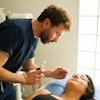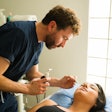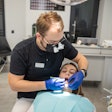
Regular use of aspirin or another nonsteroidal anti-inflammatory (NSAID) pain medication may increase the survival rates for certain head and neck cancer (HNC) patients, according to a new study. However, researchers caution that there are no specific regimen recommendations at this time.
Researchers analyzed more than 260 patients with head and neck squamous cell carcinoma (HNSCC) who had their tumors surgically removed. They reported that patients with a mutation in a specific gene (the PIK3CA gene) who took NSAIDs regularly had a five-year survival rate of 78% compared with a survival rate of 45% for those who did not regularly take NSAIDs. The study was published January 25 in the Journal of Experimental Medicine.
"The present study is the first to demonstrate that regular NSAID usage confers a significant clinical advantage in patients with PIK3CA-altered HNSCC," stated study co-author Jennifer Grandis, MD, in a press release. Dr. Grandis is a professor in the department of otolaryngology -- head and neck surgery at the University of California, San Francisco School of Medicine.
NSAID use benefit
HNSCC accounts for about 4% of all cancers in the U.S., according to the study authors. The PIK3CA gene is the most commonly altered oncogene in this cancer (an oncogene is a gene with the possibility of causing a cancer). Around 35% of HNSCC tumors carry mutations that activate the PIK3CA gene, they noted.
“The present study is the first to demonstrate that regular NSAID usage confers a significant clinical advantage in patients with PIK3CA-altered HNSCC.”
Some studies have shown that regular use of aspirin can reduce the risk of developing the disease, but the researchers of the current study wondered if regularly taking aspirin or other NSAIDs would increase the survival rates of patients who already have developed HNSCC.
The researchers obtained the electronic medical records from the University of Pittsburgh Medical Center in Pennsylvania of 266 patients with HNSCC. They sought to investigate the interaction between NSAID use, alteration of the PIK3CA gene, and HNSCC survival. According to the records, most of the patients were treated with adjuvant chemotherapy, radiotherapy, or both.
Patients who took NSAIDs twice a week for at least six months were considered regular users. Patients whose records revealed no NSAID prescription or self-reported use were considered "never users."
For patients with the PIK3CA mutations or amplification, regular NSAID use conferred a significant, prolonged disease-specific survival (p = 0.0032; 95% confidence interval [CI], 0.09-0.62) and overall survival (p = 0.0043; 95% CI, 0.14-0.69) rates compared with nonregular NSAID users with the gene mutation.
The predicted five-year survival rate was 72% for regular NSAID users compared with 25% for nonusers. The predicted five-year overall survival rate was 78% for regular NSAID users compared with 45% for nonregular users.
No definitive statements
The authors noted that their study had several limitations, including the use of patient self-reporting for NSAID use. They also listed constraints in cohort size, particularly among subgroups, and inconsistencies in the type, timing, and dosages of NSAID therapy used by patients.
They cited these limitations as the reason they were unable to make definitive statements regarding specific therapeutic recommendations. However, they concluded that a PIK3CA mutation predicted sensitivity to NSAIDs in preclinical models.
"These findings uncover a biologically plausible rationale to implement NSAID therapy in PIK3CA-altered HNSCC," the authors wrote.



















